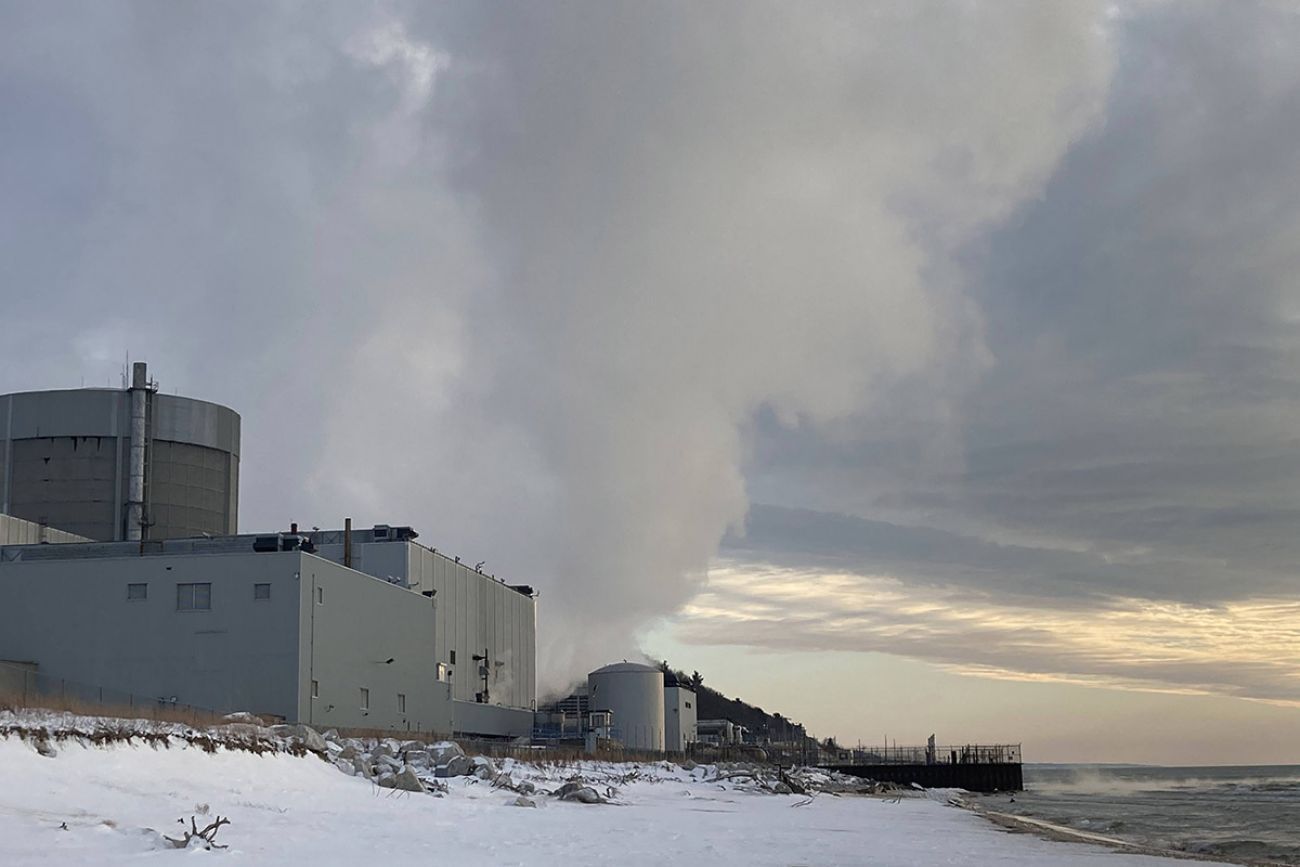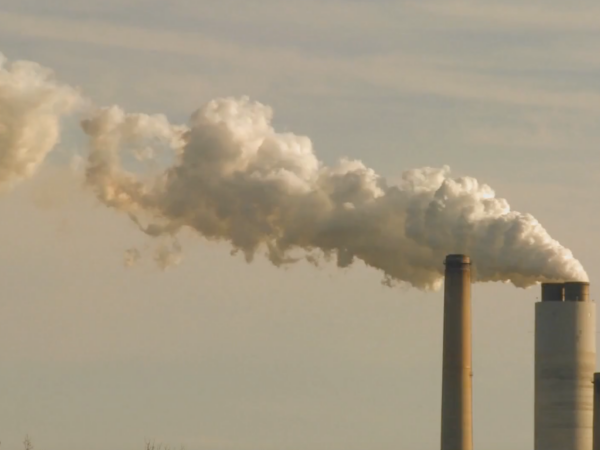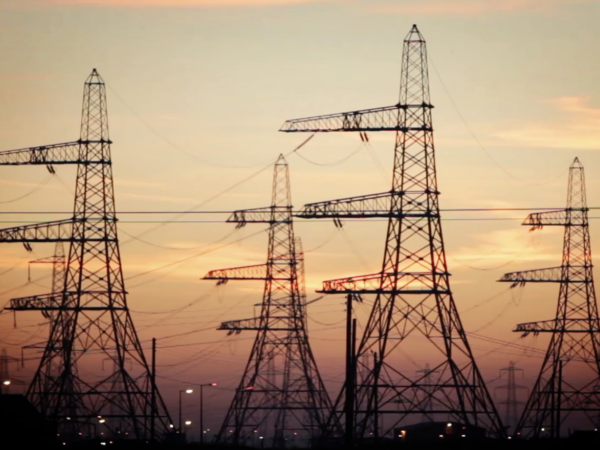
By Kelly House Bridge Michigan
The Great Lakes News Collaborative includes Bridge Michigan; Circle of Blue; Great Lakes Now at Detroit Public Television; and Michigan Radio, Michigan’s NPR News Leader; who work together to bring audiences news and information about the impact of climate change, pollution, and aging infrastructure on the Great Lakes and drinking water. This independent journalism is supported by the Charles Stewart Mott Foundation. Find all the work HERE.
- The Palisades nuclear plant closed in May 2022
- Gov. Gretchen Whitmer has pushed since then to reopen it
- A new caucus of lawmakers backs the effort, which could cost taxpayers $300 million or more
The push to repower the shuttered Palisades nuclear power plant has momentum in Lansing, with a bipartisan caucus pledging support for the plant’s revival.
Seventeen members of the newly-formed nuclear energy caucus sent a letter to Gov. Gretchen Whitmer on Thursday, thanking her for championing the energy source and promising their “full support and partnership.”
“The successful re-powering of Palisades would immediately provide safe, carbon-free, and reliable energy to a grid that desperately needs more baseload generation,” the lawmakers wrote. “Palisades would be a successful model whose reopening would positively reverberate around the world, fueled by Michigan’s unwavering grit, innovation, and determination.”
Signatories included majority and minority leaders of the Senate Energy and Environment Committee and the House Energy Committee, as well as Reps. Joey Andrews, D-St. Joseph, and Pauline Wendzel, R-Watervleit, whose districts include Palisades.
The plant, along the Lake Michigan shoreline in southwest Michigan’s Van Buren County, closed in May 2022 after five decades. Enough carbon-free energy to power hundreds of thousands of homes disappeared with the plant, undermining Michigan’s effort to ditch fossil fuel energy.
Consumers Energy, which built Palisades and had been its primary customer since selling it to a company named Entergy Nuclear, no longer wanted to pay for nuclear energy. So Entergy sold Palisades to a company called Holtec International for decommissioning.
Since then, Whitmer and other state leaders have pushed to revive the plant. They’re hoping for a federal loan or a grant from the Civil Nuclear Credit Program, a $6 billion U.S. Department of Energy initiative to bail out struggling nuclear power plants.
Holtec officials have applied for a federal loan, but have not disclosed how much they’re seeking. A similar effort to repower the nuclear Diablo Canyon Power Plant in California was awarded $1.1 billion. Beyond federal money, Holtec officials have told Michigan lawmakers they’ll need another $300 million from state taxpayers to justify reopening.
“The financial commitment from Michigan is essential to making a return to operations feasible,” company spokesperson Nick Culp said in a statement.
Whitmer has repeatedly supported the concept of ponying up state cash. The letter from the new nuclear caucus indicates there is at least some support in the 148-member Legislature.
“I could see it definitely being part of the budget process,” said Graham Filler, R-St. Johns, and co-chair of the group.
Filler said he’s “very confident” about the level of bipartisan support for funding Palisades, though he acknowledged the idea isn’t without critics.
Some environmental groups support Palisades repowering, but dozens of Michigan groups signed onto a January letter to U.S. Secretary of Energy Jennifer Granholm, urging her to reject Holtec’s bid for a bailout. They raised safety concerns, such as “embrittlement” that increases the reactor’s risk of cracking near the Great Lakes, and questioned whether reopening reactors is a good use of taxpayer money.
Nuclear energy is expensive. When Palisades was operating, a long-term contract required Consumers to buy power from the plant. At times, it cost 57 percent more than the market cost for electricity.
Kevin Kamps, a radioactive waste specialist for the activist group Beyond Nuclear, said lawmakers who support reopening Palisades are “falling for the lies of the company and the Nuclear Regulatory Commission.”
“The safety risks are all too real,” Kamps said. “They were real before Palisades shut a year ago. They’re worse now.”
Palisades failed to win a grant during the federal bailout program’s first round, which wasn’t targeted toward plants that have already closed. Now, the company is seeking a loan from a separate Department of Energy program. But grant money remains a possibility, after the Energy Department tweaked eligibility to include shuttered plants.
If successful, the effort to save Palisades would mark the first time in history that a nuclear power plant has repowered after closure.
But finding money is only part of the equation. Holtec would need to refuel the plant, hire hundreds of workers, get a license to operate the plant or find another company capable of doing so, and find a buyer for its electricity.
“We are making progress on that front,” Culp said of Holtec’s effort to recruit customers for Palisades’ power.
If Holtec secures funding and permission to reopen, he said, the two-year process to restart the plant could begin this fall.
Catch more news at Great Lakes Now:
Bill aims to allow backyard wildlife feeding, but critics fear deer disease
Featured image: The Palisades nuclear power plant shut down in May 2022, but Michigan officials say they still hope to rescue the facility near South Haven. (Bridge photo by Kelly House)
1 Comment
-
As a resident and property owner of Southwest Michigan, less than one mile from this shuttered nuclear plant, I can tell you all the residents in our community will fight as hard as possible to keep this old, embrittled plant from re-opening. Holtec just wants more money – at the cost of opening one of the oldest nuclear plants in the U.S. that was build with faulty metal in its welds which can cause embrittlement. These Michigan politicians want to keep jobs at any cost, but they are not experts on this issue.




